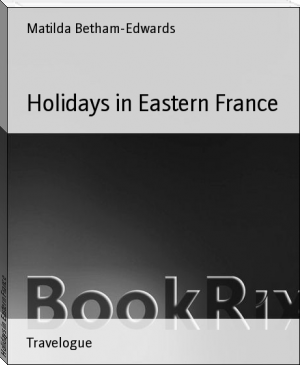East of Paris - Matilda Betham-Edwards (english readers .TXT) 📗

- Author: Matilda Betham-Edwards
Book online «East of Paris - Matilda Betham-Edwards (english readers .TXT) 📗». Author Matilda Betham-Edwards
"Il faut travailler pour ses enfants" (one must work for one's children), she said.
All these little farm-houses are so many homely fortresses, cottage and outhouses being securely walled in, a precaution necessary with aged, moneyed folks living absolutely alone.
A fourth visit was paid to a charming old Philemon and Baucis, the best possible specimens of their class. The husband lay in bed, ill of an incurable malady, and spotlessly white were his tasselled nightcap, shirt and bedclothes. Very clean and neat too was the bedroom opening on to the little front yard, beneath each window of the one-storeyed dwelling being a brilliant border of asters. The housewife also was a picture of tidiness, her cotton gown carefully patched and scrupulously clean. This worthy couple are said to be worth fifty thousand francs. The wife, a sexagenarian, does all the work of the house besides waiting on her good man, to whom she is devoted, but a married son and daughter-in-law share her duties at night. Here was no touch of sordidness or suggestion of "La Terre," instead a delightful picture of rustic dignity and ease. The housewife sold us half a bushel of pears, these two like their neighbours living by the produce of their small farm and garden.
I often dropped in upon Madame B---- to whom even morning calls were acceptable.
On the occasion of my farewell visit she had something pretty to say about one of my own novels, a French translation of which I had presented her.
"I suppose," I said, "that you have some books of your own?"
"Here they are," she said, depositing an armful on the table. "But I have never read much, and mostly _bibelots_" (trifles.)
Her poor little library consisted of _bibelots_ indeed, a history of Jeanne d'Arc for children, and half a dozen other works, mostly school prizes of the kind awarded before school prizes in France were worth the paper on which they were printed.
CHAPTER VI.
LARCHANT.
There is a certain stimulating quality of elasticity and crispness in the French atmosphere which our own does not possess. France, moreover, with its seven climates--for the description of these, see Reclus' Geography--does undoubtedly offer longer, less broken, spells of hot summer weather than the United Kingdom. But let me for once and for all dispel a widespread illusion. The late Lord Lytton, when Ambassador in Paris, used to say that in the French capital you could procure any climate you pleased. And experience proves that without budging an inch you may in France get as many and as rapid climatic changes as anywhere else under the sun. At noon in mid-May last I was breakfasting with friends on the Champs Elysees, when my hostess put a match to the fire and my host jumped up and lighted six wax candles. So dense had become the heavens that we could no longer see to handle knives and forks! Hail, wind, darkness and temperature recalled a November squall at home. Yet the day before I had enjoyed perfect summer weather in the Jardin d'Acclimitation. Invariableness is no more an attribute of the French climate than our own. Wherever we go we must take a change of dress, for all the world as if we were bound for the other side of the Tweed.
My first Sunday at Bourron, on this third visit, was of perfect stillness, unclouded brilliance and southern languor, heralding, so we fondly imagined, the very morrow for an excursion.
In the night a strong wind rose up, but as we had ordered a carriage for Larchant, and as carriages in these parts are not always to be had, as, moreover, grown folks no more than children like to defer their pleasure, off we set, two of the party on cycles forming a body guard. There seemed no likelihood of rain and in the forest we should not feel the wind.
For the first mile or two all went well. Far ahead of us our cyclists bowled gaily along in the forest avenues, all of us being sheltered from the wind. It was not till we skirted a wide opening that we felt the full force of the tornado, soon overtaking our blowzed, dishevelled companions, both on foot and looking miserable enough.
We re-entered the forest, and a little later, emerging from the fragrant depths of a pine wood, got our first view of Larchant, coming suddenly upon what looks like a cathedral towering above the plain, at its base a clustering village, whitewashed brown-roofed houses amid vineyards and orchards.
A grandiose view it is, recalling the minaret of Mansourah near Tclemcen in Algeria, that gigantic monolith apparently carved out of Indian gold and cleft in two like a pomegranate.
Slowly we wound up towards the village, the wind, or rather hurricane, gathering in force as we went. It was indeed no easy task to get a nearer view of the church; more than once we were compelled to beat a retreat, whilst it seemed really unsafe to linger underneath such a ruin.
Imagine the tower of St. Jacques in the Rue de Rivoli split in two, the upright half standing in a bare wind-swept level, and you have some faint notion of Larchant. On nearer approach such an impression of grandeur is by no means diminished. This magnificent parish church, in part a ruin, in part restored, rather grows upon one upon closer inspection. Reparation, for want of funds, has stopped short at the absolutely necessary. The body of the church has been so far restored as to be fit for use, but its crowning glory, the tower, remains a torso.
The front view suggests no such dilapidation. How long will the shell of that lofty twelfth century tower remain standing? To my mind it hangs over the low, one-storeyed houses at its feet, a veritable sword of Damocles, sooner or later sure to fall with crushing force. The porch shows much beautiful carving, unfortunately defaced, and the interior some perfect specimens of pure Gothic arches, the whole whitewashed and bare as a barn.
Larchant in the middle ages was a famous pilgrimage, and in the days of Charles IX. a halting stage on the road to Italy. It does not seem to attract many English pilgrims at the present time. Anyhow tea-making here seems a wholly unknown art. In a fairly clean inn, however, a good-natured landlady allowed us to make ourselves at home alike in kitchen and pantry. One of our party unearthed a time-honoured tea-pot--we had of course taken the precaution of carrying tea with us--one by one milk and sugar were forthcoming in what may be called wholesale fashion, milk-jugs and sugar-basins being apparently articles of superfluity, and in company of a charming old dog and irresistible kitten, also of some quiet wayfarers, we five-o'clocked merrily enough.
Our business at Larchant was not wholly archaeological. Buffeted as we were by the hurricane, we managed to pay a visit in search of eggs and poultry for the table at home.
If peasant and farming life in France certainly from time to time reminds us of Zola's "La Terre," we are also reminded of an aspect which the great novelist ignores. As will be seen from the following sketch sordidness and aspiration oft times, I am almost tempted to say, and most often, go hand in hand.
We see one generation addicted to an existence so laborious and material as to have no counterpart in England; under the same roof growing up another, sharing all the advantages of social and intellectual progress.
Not far from the church we called upon a family of large and wealthy farmers, owners of the soil they cultivate, millionaires by comparison with our neighbours at Bourron.
We arrived in the midst of a busy time, a steam corn thresher plying in the vast farm-yard. The interior of the big, straggling farm-house we did not see, but two aged women dressed like poor peasants received us in the kitchen, a dingy, unswept, uninviting place, as are most farm-house kitchens in France. These old ladies were respectively mother-in-law and aunt of the farmer, whose wife, the real mistress of the house, soon came in. This tall, stout, florid, brawny-armed woman was evidently what French folks call _une maitresse femme_, a first-rate housewife and manager; a somewhat awe-inspiring person she looked as she stood before us, arms akimbo, her short coarse serge skirt showing shoes well acquainted with stable and neat-house, one dirty blue cotton apron worn over another equally dirty. Now, my hostess, as I have said, wanted to purchase some poultry for the table, and here comes in the moral of my story. Vainly the lady begged and begged again for a couple of chickens. "But we want them for our Parisians," the three farming women reiterated, one echoing the other. "Our Parisians, our Parisians," the words were repeated a dozen times. And as was explained to me afterwards, "our Parisians," for whom the pick of the poultry yard was being reserved, were the two sons of the rather forbidding-looking matron before us, young gentlemen being educated in a Paris Lycee, and both of them destined for the learned professions!
This side of rural life, this ambition, akin to what we see taking quite another form among ourselves, Zola does not sufficiently realize. Shocking indeed were the miserliness and materialism of such existences but for the element of self-denial, this looking ahead for those to follow after. How differently, for instance, the farm-house and its group must have appeared, but for the evident pride and hopes centred in _nos Parisiens_, who knows?--perhaps youths destined to attain the first rank in official or political callings!
The farther door of the smoke-dried kitchen opened on to the farm-yard, around which were stables and neat-houses. In the latter the mistress of the house proudly drew our attention to a beautiful blue cow, grey in our ignorance we had called it, one of a score or more of superb kine all now reclining on their haunches before being turned out to pasture. In front, cocks and hens disported themselves on a dunghill, whilst beyond, the steam corn thresher was at work, every hand being called into requisition. No need here for particulars and figures. The superabundant wealth, so carefully husbanded for the two youths in Paris, was self-evident.
The tornado, with threatening showers and the sight of a huge tree just uprooted by the road side, necessitated the shortest possible cut home. In fair weather a prolongation of our drive would have given us a sight of some famous rocks of this rocky forest. But we carried home memories enough for one day.
CHAPTER VII.
RECLOSES.
This ancient village, reached by the forest, is one of the most picturesque of the many picturesque places hereabouts. Quitting a stretch of pinewood we traverse flat cultivated land, gradually winding up towards a long straggling village surmounted by a lofty church tower of grey stone. On either side of this street are enclosed farm-houses, the interiors being as pictorial as can be imagined. Untidy as are most French homesteads, for peasant farmers pay little court to the Graces, there is always a bit of flower garden. Sometimes this flower garden is aerial, a bower of roses on the roof sometimes amid the incongruous surroundings of pig styes or manure heaps. This region is a petunia land; wherever we go we find a veritable blaze of petunia blossoms, pale mauve, deepest rose, purple and white massed together without order or view to effect. In one of the little fortresses--for so these antique farmhouses may be called--we saw a rustic piazza,





Comments (0)